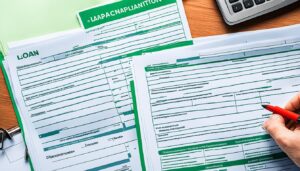Are you ready to get a bank loan but don’t know what documents you need? Getting through the loan application process can be tough. But, knowing what you need is key to getting approved.
We’ll show you all the important papers you’ll need. This includes personal info, proof of income, and even credit checks. We’ve got everything covered for you.
If you’re new to bank loans or just want to make sure you have everything, this guide is for you. It’s based on rules from the Federal Reserve and the Consumer Financial Protection Bureau. Read on to make sure you have all the right documents for your next loan.
Personal Identification for Loan Application
When you apply for a loan, showing valid personal ID is key. It proves you are who you say you are. Banks use this to check if your application is real and safe.
Types of Identification Documents
Banks and lenders look for government-issued IDs. They usually accept driver’s licenses, passports, and state ID cards. These IDs confirm your identity and stop identity theft.
| Document Type | Accepted Forms | Details |
|---|---|---|
| Driver’s License | State-Issued | Includes photograph and address |
| Passport | Federal-Issued | Internationally recognized ID |
| State ID | State-Issued | Contains key personal information |
Importance of Valid Identification
It’s very important to have valid ID when you apply for a loan. IDs from the government help banks quickly check if you’re who you say you are. This step is vital to protect both lenders and borrowers from fraud and identity theft, as Experian points out.
Income Verification for Loan Process
When you apply for a loan, lenders check if you can pay it back. They look at your income documents to see if you’re financially stable.
Pay Stubs and W-2 Forms
For those with jobs, pay stubs and W-2 forms are key. Pay stubs show how much you earn and what you pay in taxes. W-2 forms give a yearly view of your income and taxes.
| Document Type | Provider | Frequency | Details |
|---|---|---|---|
| Pay Stubs | Employer | Bi-weekly/Monthly | Consistent income, deductions |
| W-2 Forms | Employer | Annually | Yearly earnings, taxes withheld |
Tax Returns for Self-Employed
Self-employed folks need tax returns to show they can pay back loans. The IRS wants detailed income and expense reports. These documents prove your financial health over time.
Key Elements of Tax Returns for Self-Employed:
- Detailed income reporting
- Records of business expenses
- Yearly financial summary
Both job holders and self-employed people must give up-to-date income proof. This makes lenders trust your financial stability.
Employment Verification for Loan Consideration
Employment verification is key in the loan process. It shows lenders if a borrower is financially stable. A steady job history makes a borrower look more reliable, helping lenders feel less risk.
Banks use many ways to check if someone is employed. They talk to HR, look at Labor Department papers, and do direct checks. This mix makes sure the job info is right.
A detailed job history proves a borrower’s income is steady. This helps lenders feel more confident about lending. Here are some common ways to verify employment:
- Information from Human Resources Departments
- Department of Labor Documentation
- Direct Verification Procedures by Banks
Financial Statements for Loan Approval
Lenders use financial statements to check if you can pay back a loan. These documents show what you own and how much money you have. They look at bank statements and investment portfolios to decide if you’re a good candidate for a loan.
Bank Statements
Bank statements show your financial activity over time. They are key because they prove you have assets and can manage money. Lenders check these to see if you can afford to repay the loan.
The Federal Deposit Insurance Corporation (FDIC) says it’s important to have accurate bank statements. This helps lenders understand your financial situation and make better decisions.
Investment Portfolios
Investment portfolios include things like stocks and bonds. They show your long-term financial health and how well you manage money. Lenders look at these to see if you’re financially stable.
The Securities and Exchange Commission (SEC) says it’s crucial to disclose your investments accurately. This helps lenders understand your financial situation and if you can repay the loan.
Here’s a comparison of what lenders look at in bank statements and investment portfolios:
| Evaluation Criteria | Bank Statements | Investment Portfolios |
|---|---|---|
| Transaction History | Monthly inflows and outflows | Quarterly or annual performance |
| Liquidity | Immediate cash availability | Long-term financial investments |
| Stability | Consistency of income | Portfolio diversification |
| Asset Verification | Verification of cash reserves | Verification of investment value |
By looking at both bank statements and investment portfolios, lenders can make informed decisions. They can see if you’re financially stable and if you have the assets to repay the loan.
Credit History Checks for Loan Eligibility
Checking a borrower’s credit is key in loan approval. Lenders look at credit reports and scores to decide if they can lend. This part talks about what matters: credit reports and scores.
Credit Reports
Credit reports show a person’s credit history. They include credit accounts, payment history, and debts. The big three U.S. credit bureaus—Equifax, Experian, and TransUnion—make these reports.
People can get a free report from each bureau once a year. This is thanks to the Fair Credit Reporting Act (FCRA). It helps keep the credit process fair and clear.
Credit Scores
Credit scores are numbers based on your credit history. The FICO score is the most used, ranging from 300 to 850. A higher score means you’re less risky to lenders.
Things like payment history and how much you owe affect your score. Knowing your score helps lenders set better loan terms and rates.
It’s important for both borrowers and lenders to understand credit history. Borrowers should manage their credit well. Lenders use reports and scores to make fair loan decisions.
| Credit Bureau | Service | Website |
|---|---|---|
| Equifax | Credit Reports | Equifax.com |
| Experian | Credit Reports | Experian.com |
| TransUnion | Credit Reports | TransUnion.com |
Collateral Documentation for Secured Loans
When you get a loan with collateral, you need to give certain documents. This is to make sure the asset can be used as security. The process is detailed to protect both you and the lender.
First, property valuations are key. You need accurate values to show the worth of real estate as collateral. These values must follow the Appraisal Foundation’s standards for consistency and accuracy. Lenders usually ask for a formal appraisal by a licensed expert to check the property’s market value.
Other assets like vehicles can also be used as collateral. If you use a vehicle title, you must provide the right titles and registration papers. State motor vehicle departments keep records of vehicle titles. This helps lenders check ownership and lien status easily.
| Collateral Type | Required Documentation |
|---|---|
| Real Estate | Formal appraisal report adhering to Appraisal Foundation standards |
| Vehicles | Vehicle title and registration documentation verified by state motor vehicle departments |
Banks also have rules for accepting collateral. They might ask for insurance, keeping the asset in good condition, and regular checks on its value. By carefully documenting and appraising assets, lenders can lower risks. They make sure the collateral’s value is enough to cover the loan.
Getting accurate property valuations and detailed collateral documents is crucial for securing loans. Whether it’s real estate or vehicles, having all the right documents protects both sides in the lending process.
Documentation for Online Loans
The lending industry is changing fast, thanks to digital technology. Now, applying for online loans is quick and easy. It’s important to know about digital checks and e-signatures.
Digital Verification Processes
Digital checks are key in online loan apps. They use cool tech like biometrics and encryption to confirm who you are. Sites like DocuSign make it easy and safe for you to apply online.
Required Electronic Signatures
The E-SIGN Act makes e-signatures as good as paper ones. It says e-signatures are legal if they meet certain rules. Lenders use special checks to make sure e-signatures are real, keeping everything safe.
This means you can finish loan deals online easily and legally. You don’t need to deal with paper anymore.
Knowing about digital checks and e-signatures helps you apply for online loans smoothly. You’ll meet all the requirements quickly and safely.
Specific Documents for Different Types of Loans
Getting a loan needs specific papers, depending on the loan type. This includes mortgages, auto loans, and business loans. Knowing what documents are needed is key for a smooth approval.
Home Loans
Home loan applications need lots of detailed paperwork. Here are the main documents:
- Proof of income (e.g., pay stubs, tax returns)
- Bank statements
- Credit report
- Property appraisal
- Proof of down payment
These help lenders check if you can afford the loan. They make sure you meet the rules set by places like HUD (U.S. Department of Housing and Urban Development).
Auto Loans
Auto loans need special documents to check your finances and the car. You’ll need:
- Income proof (e.g., employment verification, tax returns)
- Credit history
- Vehicle information (e.g., title, registration)
- Insurance details
DMV documents might also be needed for the loan approval process.
Business Loans
Business loans need detailed and extensive paperwork. Important documents include:
- Business plan
- Financial statements (e.g., balance sheets, profit and loss statements)
- Tax returns
- Legal documents (e.g., business licenses, incorporation papers)
- Personal financial statements
The Small Business Administration (SBA) and other lenders use these to check if the business is viable and creditworthy.
Other Miscellaneous Documents
Beyond the main documents needed for bank loans, borrowers may have to provide extra papers. These documents help complete the application package. They offer important details and clear up any financial questions or issues.
Loan Application Forms
The loan application form is key in the loan process. For example, Form 1003, or the Uniform Residential Loan Application, is used a lot in mortgages. It asks for personal info, job history, income, and assets.
It’s important to fill out this form correctly. This lets lenders do a full check and decide if they can approve the loan.
Letters of Explanation
Letters of Explanation help lenders understand any credit issues. They explain things like late payments or debts. A good letter can really help your loan chances by showing your financial situation clearly.
It’s crucial to make these letters detailed and honest. This way, they can support your loan application well.
Conclusion
Having all your documents ready is key for a smooth loan application. You need personal ID, credit history, and more. Each document shows you’re ready for a loan.
Preparation makes the process easier and faster. This increases your chances of getting approved.
Use tools and resources to help manage your documents. Digital platforms offer secure storage and easy access. This makes the process less stressful.
Being proactive in gathering and checking your records helps too. It reduces stress and avoids delays.
This review shows how important careful preparation is. Follow these steps to confidently apply for loans. Being organized and resourceful helps you navigate the financial world easily.













